

Janet Lexow
In the Digital Age, What Becomes of the Library? Nashville’s Main Public Library, located in a stately building in the heart of downtown, has a children’s section filled with comfortable sitting areas, oversized art, and a state-of-the-art theater for puppet shows and interactive story time.
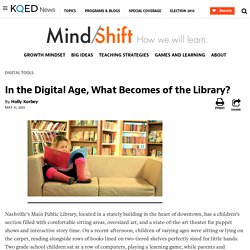
On a recent afternoon, children of varying ages were sitting or lying on the carpet, reading alongside rows of books lined on two-tiered shelves perfectly sized for little hands. Two grade-school children sat at a row of computers, playing a learning game, while parents and caregivers checked out books via computer. Using Social Media to Engage Teens in the Library. “Brother Mike” Hawkins (at left) and YOUmedia’s Spoken Word team at the“Louder Than a Bomb” poetry competition in Chicago, March 2013.Photo courtesy of “Brother Mike” Hawkins.
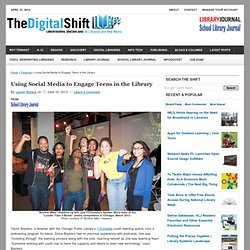
Taylor Bayless, a librarian with the Chicago Public Library’s YOUmedia youth learning space, runs a podcasting program for teens. Since Bayless had no previous experience with podcasts, she was “muddling through” the learning process along with the kids, teaching herself as she was teaching them. “Someone working with youth has to have the capacity and desire to learn new technology,” says Bayless. Teacher Librarians Are Key to the Digital Shift. I hate textbooks.
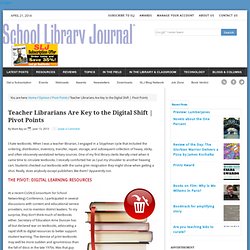
When I was a teacher librarian, I engaged in a Sisyphean cycle that included the ordering, distribution, inventory, transfer, repair, storage, and subsequent collection of heavy, sticky, and often obscenely vandalized tertiary sources. One of my first library clerks literally cried when it came time to circulate textbooks. I stoically comforted her as I put my shoulder to another heaving cart. Students checked out textbooks with the same grim resignation they might show when getting a shot. 16 Reasons Librarians are Still Extremely Important. 16 Reasons Why Libraries and Librarians are Still Extremely Important Many predict that the digital age will wipe public bookshelves clean, and permanently end the centuries-old era of libraries.

5 Studies Showing Why Reading is Healthy! If you’re a book worm, no tablet can take the place of the wonderful tactile experience of reading a good book.

Whether you like novels or history books, books on great leaders or nutrition, reading is an extremely healthy habit. Library Science 101: INFOGRAPHIC. Steal This Infographic: Librarians as Tech Leaders. SLJ’s May 2011 cover featured the technology survey.
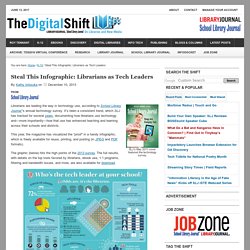
5 Studies Showing Why Reading is Healthy! Why you should support your local library. Surprising Book Facts- Points to ponder. Created 1 Apr 2014 - 6:44am by Amy Ransom I saw this on Facebook and I wanted to know more about how the graphic came to be.
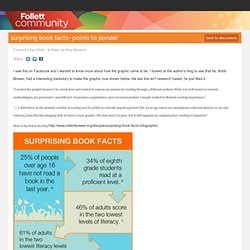
I looked at the author's blog to see that he, Robb Brewer, had a interesting backstory to make the graphic now shown below. His last line isn't research based, he just liked it. "I created the graphic because I’m a book lover and wanted to express my passion for reading through a different method. Libraries matter: 10 fantastic library infographics. Library infographics presented below clearly show that being a librarian today is not about surviving any longer.

It’s great that such infographics are created. Survey Infographic. Infographic: Anatomy of a Librarian. How Students and Teachers See Assigned Reading. Crowdfunding real-life, citywide choose-your-own-adventure stories. LISTSERV 16.0 - LM_NET Archives. Crowdfunding real-life, citywide choose-your-own-adventure stories. Infographic: Print Books Are Far From Dead. In 2012, Amazon.com began selling more e-books than print books for the first time ever.
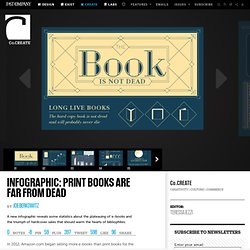
Along with the decline of the once-mighty Barnes & Noble super store, the forecast looked pretty bleak for those addicted to the tactile feel of physical books. A closer look at the numbers, however, reveals that hardcover and paperback books are further from extinction than we might have thought. According to License Direct, there are a number of reasons to be optimistic about the future of the book. The professional license database has put together an infographic that culls data from several sources that attest to the public's stubborn fondness of print. IDEA WATCH: Dissecting Ebooks and Libraries. In theory, ebooks can provide our students with easy access from all of their devices to reading material.
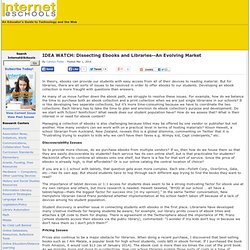
But for libraries, there are all sorts of issues to be resolved in order to offer ebooks to our students. Developing an ebook collection is more fraught with questions than answers. As many of us move further down the ebook path, we struggle to resolve these issues. For example, how do we balance the time to purchase both an ebook collection and a print collection when we are just single librarians in our schools? Four nifty ways to display and curate Twitter. Four nifty ways to display and curate Twitter. Students Reading E-Books Are Losing Out, Study Suggests. Could e-books actually get in the way of reading? That was the question explored in research presented last week by Heather Ruetschlin Schugar, an associate professor at West Chester University, and her spouse, Jordan T.
Schugar, an instructor at the same institution. Speaking at the annual conference of the American Educational Research Association in Philadelphia, the Schugars reported the results of a study in which they asked middle school students to read either traditional printed books or e-books on iPads. The students’ reading comprehension, the researchers found, was higher when they read conventional books. In a second study looking at students’ use of e-books created with Apple’s iBooks Author software, the Schugars discovered that the young readers often skipped over the text altogether, engaging instead with the books’ interactive visual features.
College libraries should keep their books in the stacks.